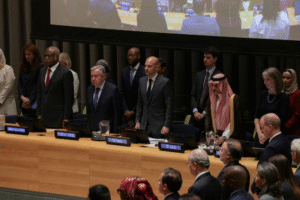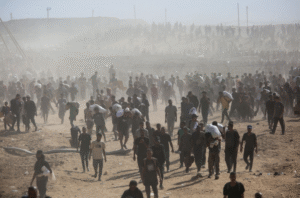To
Y.B. Tan Sri Othman Hashim
The Special Envoy of the Asean Chair on Myanmar
February 12, 2025
Re: Proposed Malaysian-led ASEAN Peace Negotiation Plan for Myanmar
As-Salamu alaykum WBT
Dear Y.B. Tan Sri,
Congratulations for after serving as the Former Human Rights Commission (Suhakam) chairman, former secretary-general of the Foreign Ministry, the Permanent Representative of Malaysia to the United Nations in Geneva, Switzerland, before being posted to Washington DC as the Ambassador of Malaysia to the United States, an Ambassador of Malaysia to Czech Republic, and in various postings in Wisma Putra, now YB Tan Sri is appointed as The Special Envoy of the Asean Chair on Myanmar.
Congratulations again for just after appointed in this very important and difficult post, Y.B. Tan Sri had already travelled to Myanmar and met the SAC Junta and at Thailand met the NUG led ERO representatives
I am a Medical Officer for nearly 50 years and migrated to Malaysia for nearly 40 years. I am interested in politics and even had Myanmar political interviews with YAB Tun Dr M and YAB Dato’ Sri Dr Wan Aziza before. You could read about these interviews here…
1/ YAB Tun Dr M’s interview @ https://drkokogyi9.wordpress.com/2018-may-new-prime-minister-of-malaysias-myanmar-politics-interview-with-me/
2/ YAB Dato’ Sri Dr Wan Aziza’s interview @ https://drkokogyi9.wordpress.com/2018-may-new-deputy-prime-minister-of-malaysias-myanmar-politics-interview-with-me/
Please may your honour kindly allow me to present the ‘out of the box’ concept proposal for a Myanmar peace negotiation plan offering a pragmatic and inclusive approach, balancing immediate conflict resolution with long-term national stability and justice.
I hope and pray that Y.B. Tan Sri have already noticed that we need to persuade China, as it has the most powerful influence on Myanmar Junta and many opposition groups especially on northern EROs and Arakan Army.
And it is very important to get agreement between the Bangladesh government and Arakan Army (AA) and its leading political party the United League of Arakan (ULA) for the repatriation and future of Rohingya Refugee Muslims.
A. Leadership and Participants
The peace negotiation should be led by Malaysia within the ASEAN framework, with key regional and international stakeholders involved.
ASEAN Members: Malaysia (lead), Thailand, Singapore, Indonesia
Key Regional Powers: China, India, Bangladesh
International Stakeholders: QUAD (Australia, India, Japan, United States)
United Nations (UN)
B. Parties to be Invited
A balanced and inclusive negotiation must involve representatives from all relevant factions in Myanmar, including:
Myanmar Junta (State Administration Council – SAC)
National Unity Government (NUG)
Ethnic Resistance Organizations (EROs)
Selected People’s Defense Forces (PDFs)
C. Host Country for Negotiation
The peace talks should be held in a neutral and accessible location, preferably in:
Malaysia or
Thailand
D. Objectives of the Peace Negotiation
The core objectives of the negotiation process should include:
Cessation of Civil War: Establish an immediate and enforceable ceasefire.
Post-war Administration: Develop a framework for transitional governance.
Security Guarantees: Ensure the safety of all parties involved in the peace process.
Protection of Foreign Investments: Safeguard ongoing international projects and economic stability.
Humanitarian Aid and Assistance: Facilitate aid distribution to affected communities.
Rehabilitation and Rebuilding: Plan for national reconstruction efforts.
Truth and Reconciliation: Implement a South African-style Truth and Reconciliation Commission (TRC) to address past injustices.
Reference: Truth and Reconciliation Commission @ https://www.justice.gov.za/trc/
E. Beyond Reconciliation: Compensation and Military Reformation
Myanmar’s reconciliation process should not stop at TRC but must extend further with concrete actions:
Compensation for Victims:
Provide financial and material compensation to victims of conflict, including families of the deceased, injured, jailed, and tortured, as well as those who lost property and homes.
Compensation sources should include:
i. Myanmar military leadership and military-owned businesses.
ii. The new Myanmar state.
iii. International donors.
Military Reform:
The military must return to its barracks and disengage from political affairs.
Military personnel who are free from crimes may voluntarily enlist in a newly structured military that includes members from EROs, PDFs, and other reformed entities.
Safe Exit for Junta Leaders:
Senior leaders of the Myanmar military (SAC) and their families must be granted immunity and provided with options for resettlement within Myanmar or abroad.
Potential resettlement locations may include China, Russia, ASEAN countries, the US, EU, Australia, and Canada.
A mutually agreed-upon financial arrangement should allow them to repatriate a reasonable amount of assets for their living expenses and business ventures.
F. Future Governance Framework
Myanmar’s future governance must be structured as a Federal Democratic Union of Myanmar, ensuring:
A truly federal system that respects ethnic autonomy.
Non-alignment in international affairs, maintaining neutrality between global powers.
Wa Salaam,
Thanking your Honour
Yours Humbly
Dr Abdul Rahman Zafrudin @ Ko Ko Gyi







